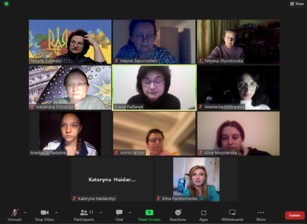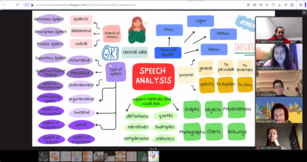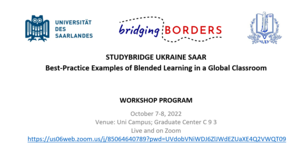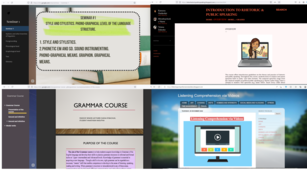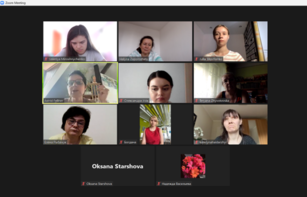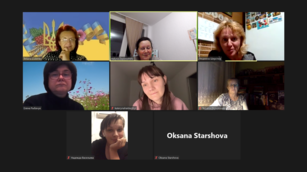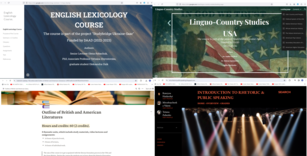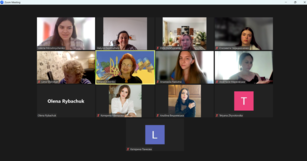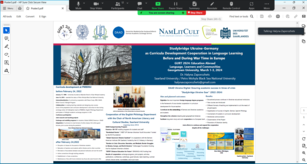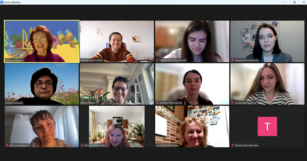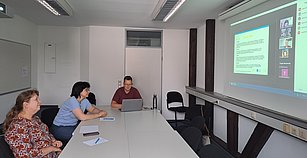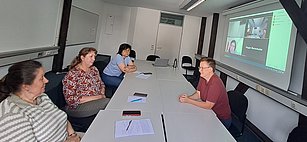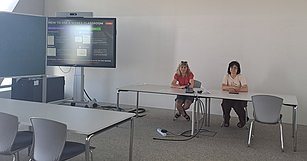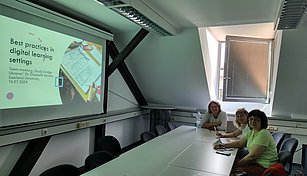Partner Universities
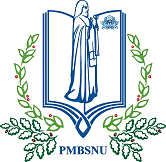

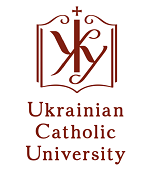

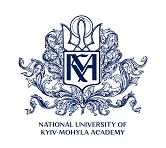
Studybridge Ukraine-Saar
DAAD funding line "Ukraine Digital: Ensuring academic success in times of crisis" (since 2022, ongoing)
With this project, Saarland University aims to support the partner universities in Ukraine in their ongoing teaching, to develop common courses/modules/study programs and offer double degrees. The cooperation covers several departments from 3 faculties (Humanities, Natural Sciences, Social Sciences) and includes online teaching, trainings, study and research stays. The objectives are not only to support the current online teaching but also to develop new courses and to work on topics relevant for the period after the war. Students and researchers will be prepared after their return to work on the (re)building of universities’ structures and teaching programs continuing the cooperation with Saarland University and other EU partners.
Digitalization of the most important foreign language degree programs
The project “Studybridge Ukraine-Saar. Digitalization of courses in German, English, and Spanish Philology” is part of the funding line “Ukraine digital: Ensuring academic success in times of crisis” (2022-2024). The German Academic Exchange Service (DAAD) finances the program with funding provided by the Federal Ministry of Education and Research (BMBF). The realization of the project is made possible due to long-standing cooperation between the Faculty of Philosophy at Saarland University (USAAR) and the Faculty of Philology at Petro Mohyla Black Sea National University (PMBSNU) in Mykolaiv. The project focuses on the bachelor’s and master’s degree programs in German, English, and Spanish languages which are among the most important languages of communication and trade both within Europe and globally. To cope with the workload, we formed three project groups: German Studies, English/American Studies, and Romance Studies. In each group, a chair of Saarland University cooperates with colleagues, doctoral candidates, and students who have remained in Ukraine as well as those who were forced to flee to Europe.
Measures NamLitCult is involved in:
- Measure 1: Digital infrastructure for virtual teaching and research
- Measure 2: Visit and supervision of Ukrainian researchers
- Measure 12: Student mobility in winter semester
- Measure 14: Concept development of degree programs BA/MA in modern philologies
- Measure 15: Course design for BA/MA in modern philologies
- Measure 16: Creation of structures for ensuring the sustainability
The ongoing project was launched to take up the challenge of accompanying the scholars and students of Ukraine in the situation that threatens their existence. The constant attacks on the energy infrastructure, problems with electricity and the internet in Ukraine call for the constant need for adapting and being flexible both in teaching and learning. Digital teaching as well as further implementation of the synchronous, asynchronous, and hybrid formats are important components here. Scholarships for students give indigent students the opportunity to continue attending courses and to enhance their research and project participation skills. One of the main aims of the project “Studybridge Ukraine-Saar”– digitalization of courses at Ukrainian universities – enables the creation of sustainable content that will be available beyond the time of one semester and can be used by multiple cohorts of students at PMBSNU and other Ukrainian universities.
Phase 1 (August – December 2022)
The work on the project “Studybridge Ukraine-Saar” started in 2022. The digitization of courses for the Faculty of Philology at Petro Mohyla Black Sea National University involved the cooperation of colleagues who are still in Mykolaiv, other places in Ukraine, as well as the ones who have fled. All participants took part in regular online meetings during the semester to set the aims, discuss the progress of the project, and evaluate the preliminary and final results. The integration of faculty from partner universities has created a new culture of team teaching that innovates former teaching methods using new digital formats. At the very beginning of the project all the participants evaluated the existing study programs at the Philology Department at PMBSNU, the teaching situation and determined specific digitization needs as well as the technical capacities.
see Pictures 1 and 2
Hybrid workshop “Studybridge Ukraine-Saar. Best-Practice Examples of Blended Learning in a Global Classroom” (October 2022)
In October Prof. Fellner organized a hybrid workshop for the English and German groups which provided useful online tools and instructions on how to integrate activities in a virtual classroom environment. The experience in digital teaching of German colleagues at Saarland University is of great importance as it introduced best practices of digital foreign language teaching and was a unique opportunity to listen and participate in the discussion of the following presentations: Past? Tense! Future? Perfect! A Moodle-based introduction to the English tense and aspect system (Daniel Honert), Setting up and running a listening course (Dr. Henry John Rademacher), Introducing the ‘Cooped-up-clips’. Teaching videos as the backbone for multi-modal learning” (Martin Kopf-Giammanco), How to make lecture videos that your students will actually watch (Dr. Carrie Ankerstein), etc. A one-day didactic Workshop for the Spanish group was held on the 17th of October.
see Picture 3
The best practices of USAAR colleagues were an excellent help for Ukrainian teachers at the beginning of the project. They used the acquired knowledge to prepare their courses and combine different educational digital tools (video lectures, quizzes, interactive tests, etc.), to create interactive platforms that provide an effective self-paced learning environment for Ukrainian students.
During the first phase, the English team successfully digitalized main courses for the students of English Philology at the BA and MA levels and they are available on the Moodle platform of PMBSNU:
- Digital Learning and Pedagogy (Part 1)
- Listening Comprehension via Videos
- Practical Grammar Course
- Stylistics of the English Language
see Picture 4
Phase 2 (January – December 2023)
The English group successfully continued to work on the digitalization of the main courses for the students of English Philology at the BA and MA levels during the second phase of the project. An important achievement of the first and second phases of the project was establishing the structural framework and providing materials that enabled lecturers to digitalize their courses. These resources (e.g. how to create a teaching video, how to create a Moodle class, etc.) remain available for future semesters. The lecturers that are involved in the project have gained experience in creating digital content which enables them not only to create new teaching materials in the future but also to disseminate the acquired knowledge. The teams which consisted of teachers and students proved to be very successful as the process of teaching and learning in collaboration gained good results. Regular meetings helped to discuss the progress of the course development, share and discuss ideas, innovative tools, and assess the results of the completed work.
see Pictures 5 and 6
In the second phase of the project, the English group focused on the following courses for BA students:
- Digital Learning and Pedagogy (Part 2)
- Introduction to Rhetoric and Public Speaking
- Lexicology of the English Language
- Linguo-Country Studies: USA
- Outline of British and American Literatures
The courses are aimed at students, who already have a good command of English (level B1+) and want to deepen their professional knowledge of the language, literature, and culture of the English-speaking countries as well as to get practical skills in future professions. Lecturers of the Chair of North American Literary and Cultural Studies at Saarland University (Department head Prof. Dr. Astrid Fellner) actively collaborated in the creation of the courses and offered their expertise for the courses.
see Picture 7
The German group integrated the scholarship holders from Mykolaiv (3 students) into the new online certificate „InterDiDaF.” It is a program of blended learning and blended mobility with partly new content in intercultural communication and multilingualism at the workplace and the university (including differences in academic cultures).
The Spanish group focused on the following courses about Hispanic literary and cultural studies at BA and MA levels in the second phase: Cultural History of Spain, Spanish Literature and Film, Contemporary Latin American Literature. A lecture on Contemporary Women Writers from Spain is not only a completely new topic for Ukraine, but is also a new format, as it is planned to include interviews with women writers in the online teaching (initial commitments were obtained at the Frankfurt Book Fair in October 2022). All courses include video contributions by international researchers to offer information and knowledge about the broad, intercontinental spectrum and forward-looking perspectives of Hispanic/Latin American Studies.
In the second phase of the project, we aimed to establish and run visibility of the project among target groups and a wide audience, provide useful information on project results, and raise awareness about the existence of those results. Members of the project actively participated in conferences in Germany, Ukraine, Luxembourg, the US, and France to disseminate the results of the project.
see Pictures 8 and 9
Phase 3 (January – December 2024)
In the current situation at the beginning of 2024 further courses are needed, because many lecturers as well as students are still in different places. Even for those physically in Mykolaiv, the uncertainty of the situation and location of the university close to the battlefront does not allow for “regular” teaching, most courses are taught online.
To overcome the challenges that Ukrainian higher education has, the English group continues working on the digitalization of main courses for the students in English Philology as well as on the revision and extension of already prepared theoretical courses in the first and second phases. The previously developed courses are taught, the course materials are expanded, i.e. further interactive activities and videos are added to the ones already available. In this phase we aim to expand the audience for some of the courses: develop courses for PhD students, continue working on important courses for the BA and MA level in English Philology. The planned courses to be digitalized during the third period are:
- Business English (BA program)
- English as a First Foreign Language (B2+ C1)
- Introduction to Border Studies from a Cultural Studies Perspective (MA program)
- Pedagogy of Higher Education and Project Management (MA program)
- Scientific Communication in English (PhD program)
see Picture 10
Work Meetings at Saarland University
During the war in Ukraine, it is more important than ever to maintain the existing contacts and establish new ones, enrich the cooperation between the scholars who are currently located in Ukraine, the displaced scholars, and colleagues abroad. That is why working meetings are planned to enhance and expand the existing collaboration. Such working meetings conducted in offline and hybrid formats are fundamental for the success of the project. As onsite meetings cannot be conducted in Mykolaiv the meetings onsite at Saarland University will provide an opportunity to conduct the necessary project activities.
During the visit, the Ukrainian participants will have a short training. The training will be organized in a hybrid format as not all members of the Studybridge team from Mykolaiv may come, and possibly (due to the work schedule) not all can come at the same time.
July 2024
Hybrid workshops, onsite working meetings, and individual consultations of Ukrainian participants were organized in July at Saarland University. The Ukrainian lecturers were given individual possibility to observe the classes, discuss the curricula of the English Department and methods of teaching foreign languages and literature with experts from Saarland University. The participants could also present their courses and receive first-hand expertise and recommendations for improving and implementing their work. The expertise and training workshop for the professionalization of digital teaching was provided by two experts from Saarland University in a hybrid format. Graduate Translator Eva Nossem conducted the workshop on Digital Teaching at Saarland University and Dr. Elisabeth Venohr presented Best Practices in Digital Learning Settings. The experts discussed con texts and factors that influence digital teaching, introduced different learning apps, educational escape rooms and provided examples of their usage in foreign language digital teaching and learning settings. Besides that, the Ukrainian guests visited the University of Luxembourg (Belval Campus) and had a tour of the Learning Center.
see Pictures 11, 12, 13, 14
Extension of Phase 3 (January – June 2025)
The increasingly critical situation in Ukraine, especially the question of sufficient energy supply, shows how important this project remains for teaching and thus for students and academics in Ukraine. In January–June 2025, we extended the measures of the main project description for 2024 and of the supplement to the project description for July–December 2024. The extended measure of the main project “Grants for students” allowed indigent students to continue attending classes and to enhance their research and project participation skills despite the limitations caused by the war.
During the final phase, the English group continued the work on supporting the educational process in Ukraine by revising, digitalizing, and virtually teaching the courses that are vital for the BA, MA, and PhD programs at PMBSNU. The following courses were digitalized and/or revised during this period:
- English as a First Foreign Language, B2+, C1 levels (Part 2)
- “Civilization and Lingua Country Study of the Second Foreign Language (English)” (BA program)
- “Scientific Written Communication and Translation (in English)” (MA program)
Virtual Team Teaching
Cross-border team teaching and course revision was implemented by adding the new joint course “Introduction to Border Studies from a Cultural Studies Perspective” to the MA program. This course was digitalized in 2024. In the second semester of the academic year 2024–25, it was taught in a hybrid format by a German-Ukrainian team (Prof. Dr. Astrid M. Fellner from Saarland University, one teacher from PMBSNU currently in Ukraine, and one Ukrainian teacher currently in Europe). This course was planned as a pilot collaborative course at PMBSNU. The acquired team-teaching experience may be later implemented at other universities in case of extending the scope of the project and adding new educational partners.
Besides that, virtual teaching for students of PMBSNU was implemented by Ukrainian teachers who are now in Europe together with the teachers currently in Ukraine. In the second semester of the academic year 2024–25, the following courses were part of team teaching: “Outline of American Literature,” “Anglophone Literatures and Film,” “Civilization and Lingua Country Study of the Second Foreign Language (English).”
Study Visits at Saarland University (April–May 2025)
In April–May 2025, the Chair of North American Literary and Cultural Studies and the UniGR-Center for Border Studies at Saarland University hosted 6 scholars from PMBSNU as part of the Studybridge Ukraine-Saar Study Visits. The training organized as part of the planned working meetings consisted of an expertise and training workshop for the professionalization of digital teaching, individual consultations with experts from Saarland University, and academic activities tailored to the field of expertise of each participant. The Ukrainian lecturers had an excellent opportunity to observe the teaching practices, to discuss the curricula of the English Department and methods of teaching foreign languages and literature with experts from Saarland University. The participants also presented their courses, discussed the current achievements and challenges of the jointly developed, digitalized, and taught courses, and received first-hand expertise and recommendations for improving and implementing their work during individual consultations.
Report Phase 3 (incl. extension)
Click here to download the full documentation of Phase 3 incl. the extension period 2025!
Student Feedback
The feedback from the students at PMBSNU has been overwhelmingly positive. They profit from online courses because they can embark on their studies independent of their location at the moment and have constant access to the course materials. The teaching models dedicated to foreign language studies developed jointly by all project participants will contribute to the networking of Ukrainian and German scholars and students. The ongoing project can strengthen cohesion despite great geographical distances and is also excellently suited to facilitate a long-term study and work perspective on a European level.
Click here and also here to learn what our students said about the program!

